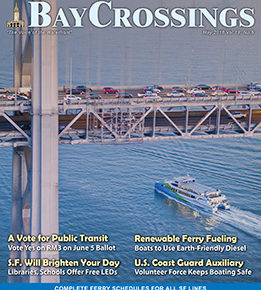Published: April, 2002
The Water Transit Authority (WTA) announced the design of the
world’s first passenger ferry powered with zero emission fuel cell technology. Specifically, with the $100,000 Federal grant the WTA sought and obtained, the agency will be enabled to design a futuristic zero emission boat for service linking Treasure Island with the East Bay and San Francisco. “This project is a big step toward extending fuel-cell technology from cars to boats. We will jumpstart the use of fuel cell technology for ferries right here in San Francisco Bay,” said San Francisco’s Mayor, Willie L. Brown.
The WTA’s funding was approved in the final hours of last year’s Congress with the help of Representatives Nancy L. Pelosi, Senators Feinstein and Boxer and the leadership of Senator Patty Murray, Chair, Senate Transportation Appropriations Committee (D-Washington).
The fuel cell operates like a battery, generating electricity through an electrochemical process that combines hydrogen and oxygen to form water vapor, heat, and electricity. Many industry leaders believe that fuel cell technology will be the top choice for the future. All of the major automakers are working to commercialize fuel cell cars.
Locally public transit bus systems will roll out a fleet of fuel cell buses in the near future. AC Transit will provide funding for eight new fuel cell buses and is working on a fueling and maintenance facility. SAMTRANS will buy six fuel cell buses for San Mateo and Santa Clara to begin service by late 2003.
By next summer, the WTA plans to complete the final design of the small fuel cell ferry that could link Treasure Island with San Francisco and the East Bay. Under the confines of current fuel cell technology, the proposed fuel cell boat’s maximum speed would reach the comparatively low speed of 12 knots, making it an ideal fit for the short distance between Treasure Island and San Francisco. The WTA plans to contribute $25,000 of its own State funds towards the project.
San Francisco Mayor Willie L. Brown and the WTA hosted a press conference on February 29, 2001 at Treasure Island to announce this project. The event was well attended by Representatives from the offices of Congresswoman Pelosi, Senators Boxer, and Feinstein, Mayor Brown’s office and the Treasure Island Development Authority. Ms. Ellen Garvey, Director, Bay Area Air Quality Management District, Roxanne Johnson, EPA and Mr. Jared Blumenfeld, Director, San Francisco Department of Environment, shared enthusiasm in the project. Russell Long and Teri Shore from Blue Water Network, a national environmental organization advocating for alternatives to diesel powered vessels participated in the event, also.
Mr. Blumenfeld, said, “This project matches futuristic thinking with today’s technology, and what better place to unveil it than on the beautiful and mystical Treasure Island.” San Francisco policymakers and environmental organizations have been urging ferry operators and the WTA to develop of emissions reduction technology for San Francisco Bay ferries.
Alternative Fuels
and Technology
Under Consideration
The WTA is studying the viability of over 38 alternative technologies to reduce and/or eliminate diesel fuel emissions in ferries. “WTA’s focus on environmental protection and its use of new technology is raising the standard for environmental awareness Bay Area wide,” said San Francisco Supervisor and WTA Board member Gavin Newsom. Supervisor Newsom, who drives an electric car, sponsored legislation in 2000 that put the City on record in support of pursuing “clean marine” technologies.
“Soybean Ferry”
The WTA was the first to test clean burning soybean-based fuel on a passenger ferry. Last Fall the WTA received Federal dollars to test this biodiesel fuel on the Oski, a 400-passenger vessel operated by Blue and Gold. (See Bay Crossings, December 2001, “Joining Together to Wish Smooth Sailing for Ferry Run on Soybeans”). The results of the study are expected next month. Biodiesel is an organically produced renewable energy resource, safe for the environment, and biodegradable. It does not contribute to harmful greenhouse gas emissions.
WTA’s Team Boards Ferries and Starts Emissions Testing
In March, the WTA’ s technical teams began collecting data on diesel emissions from three ferries operating in the Bay. They are using sophisticated equipment to collect this data with the cooperation of Golden Gate Ferries, Alameda/Oakland ferries and Vallejo Baylink. For the first time ever, these studies will produce baseline emissions data of ferries in actual service with varying number of passengers, weather conditions, routes and times of the day and will use protocols agreed-upon by regulatory agencies.

